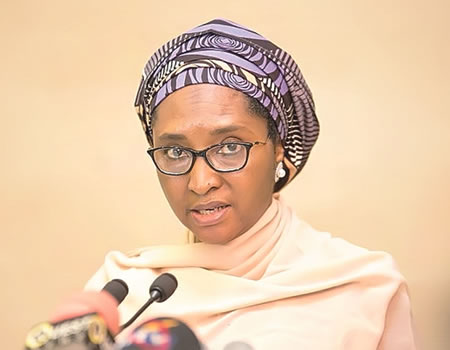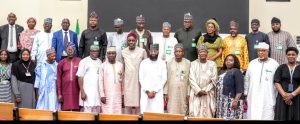Coronavirus outbreak reinforced our resolve to diversify economy – Minister of Finance

The Federal Government has revealed that the outbreak of COVID-19, popularly called coronavirus has reinforced its resolve to diversify the economy of the country, especially from over-reliance on oil.
The Minister of Finance, Mrs Zainab Shamsuna Ahmed, disclosed on Monday in Abuja, during the international conference on Nigeria’s Commodities Market by the Securities and Exchange Commission (SEC).
According to her, Nigeria is well-endowed with various commodities, comprising agriculture, energy and metal resources, and the capital market community can provide the platform and voice for the much-needed diversification.
She said: “Several national plans, programmes and projects have been directed at diversifying the production and revenue structures of our economy. While some level of achievements have been recorded in this area, more still needs to be done to ensure that our production and exports base become more robust, less vulnerable to external shocks and provide more opportunities to our teeming population.
“Interestingly, the unfolding events of the past few months, the coronavirus pandemic and the oil price war has further reinforced our resolve to diversify our national economy.
“For instance, the agriculture sector employs about 40 per cent of our labour force and accounted for 22 per cent of the country’s Gross Domestic Product (GDP) at the end of 2019. In the last five years, the sector has recorded positive growth rates, higher than that of the entire economy, and even positive in 2016 when the entire economy went into recession.
“The mining and quarrying sector, dominated by oil and gas, is also a major component of our output, accounting for 9 per cent of GDP. The sector is responsible for the bulk of Nigeria’s foreign exchange and government earnings.
“A further examination shows that commodity-dependent activities dominate our manufacturing sector. Specifically, the production of Food, Beverage, Tobacco, Textile and Wood products accounted for about 7.5 per cent of our GDP. While trading activities accounted for 15.5 per cent with many of what is traded being agriculture-based.
“Imagine when all these endowments and activities are further expanded and formalized. There will definitely be greater prosperity for everyone. I believe this Conference will contribute to realizing this vision”.
The Acting Director-General of the SEC, Ms Mary Uduk, said, “While it is clear that Nigeria is well endowed with agricultural, metals and energy commodities, our potentials in these areas are unrealised.
“The good news, however, is that the capital market can be used as an avenue to unlock these potentials and diversify the nation’s economy, while providing jobs, creating values and contributing to governments’ revenue.
“We believe that if we can develop and institutionalise vibrant commodities trading ecosystem in Nigeria, we can substantially address problems such as lack of storage, poor pricing, non-standardization, as well as low foreign exchange earnings affecting our agriculture and other commodities sub-sectors”.
The Vice President of Nigeria, Prof. Yemi Osinbajo, in his remark, said: “As we are all aware, Nigeria is working on diversifying its economy as well as its revenue sources. The need to develop other channels of generating revenue and foreign exchange is critical. This need is further underscored by the recent drop in the global price of crude oil, which also constitutes a major threat to achieving planned government expenditure.
“In realization of these, the Federal Government has put many initiatives in place to develop the agriculture and solid mineral sectors.
“Broadly, the diversification of the economy through these sectors is among the major components of the Economic Recovery and Growth Plan (ERGP) of this administration. Achieving self-sufficiency in food production and building a globally competitive economy through investment in infrastructure is therefore considered pertinent in the EGRP.
“The Government’s Rice Value Chain initiatives whereby Nigerian Farmers are equipped with improved rice seedlings, fertilizers, and borrowing facilities for production of Nigerian rice is yielding positive results; so also are related initiatives in the production and processing of other crops.“Further, the government is working towards establishing Agricultural Industrial Parks (AIPs) across our Six-Geopolitical Zones, with the sole aim of creating jobs, ensuring food sufficiency and harnessing the comparative advantage in each geopolitical zone”.






